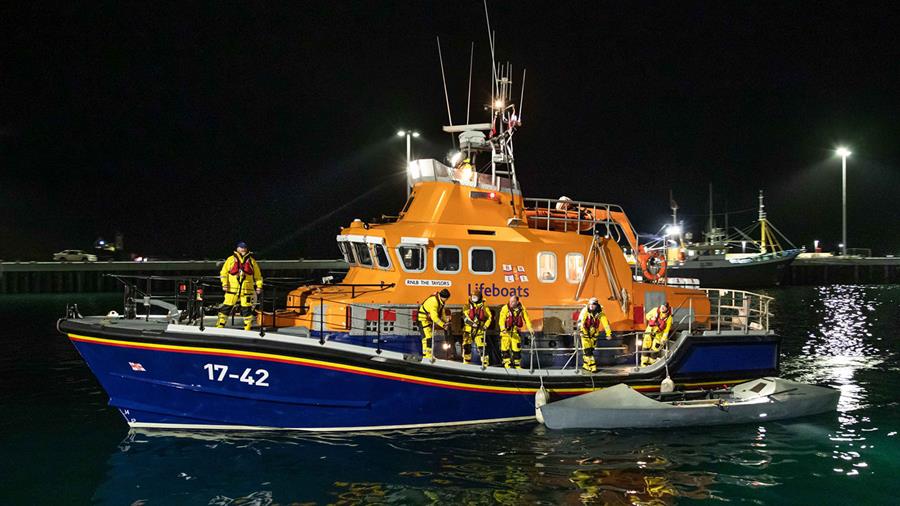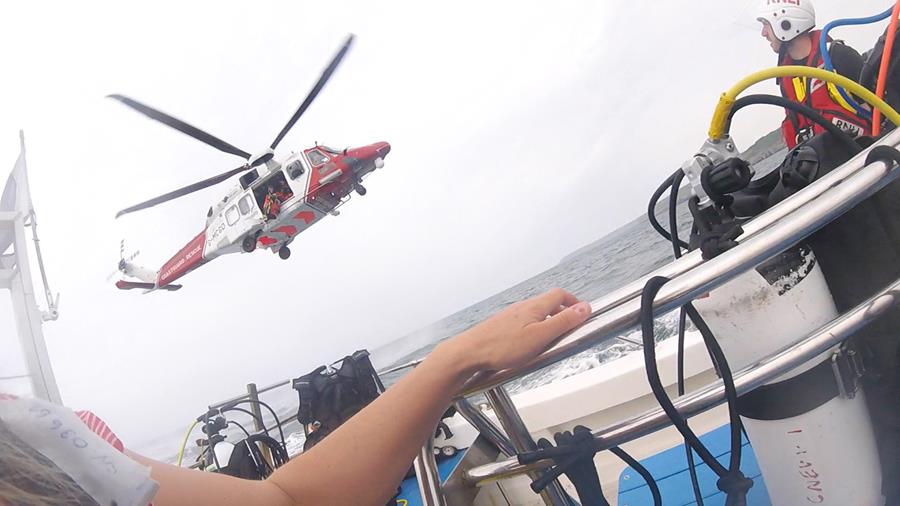
Cardiac arrest: 5 steps to survival
‘You have given a 3-year-old her daddy back.’ The words of a relieved mother whose husband suffered a cardiac arrest and is pulling through – thanks to a quick-thinking passer-by, RNLI lifeguards, coastguards, paramedics, hospital staff … and the Chain of Survival.
1) Recognise the problem and start the response
21 May had been a quiet day on Mawgan Porth Beach in north Cornwall. Sean Ashton was jogging along the sand at 5.55pm when he went into cardiac arrest. Two women on their honeymoon – one of whom was a former police officer – saw this and recognised what was happening. Rachel Bennett told the Plymouth Herald: ‘He was about 10m ahead of us and then he just went flat on his face. He certainly wasn’t breathing, so I gave him CPR while my wife called the RNLI lifeguards over.’
2) Early CPR
The lifeguards – Dave Kelly, Jackson Howell and Tim Robey – were due to clock off at 6pm. They had just started packing up their kit. Dave recalls: ‘I took a look and saw someone had already started doing chest compressions. The guy was at the water’s edge with an incoming tide, so we picked him up and brought him up the beach. I went to get comms with Falmouth Coastguard and left the guys to start CPR.’
Jackson continues: ‘I took the grab bag out of the truck. It’s got the oxygen and the defib, and the bag valve mask, which is what you use for mouth-to-mouth. I started compressions and when Tim arrived he helped me with the oxygen.’
3) Rapid defibrillation
Shocking the chest with the defibrillator might be a whole new link in the chain, but the keyword here is ‘rapid’. Thanks to the honeymooners’ actions, the lifeguards were on scene with their equipment within 5 minutes – greatly improving Sean’s chances.
Jackson says: ‘While Tim was doing the breaths I got the defib out and attached the pads. I continued the compressions and then we gave the first shock. We then had to move him up the beach again, as the tide was coming in real quick. We delivered a second shock on the beach, and then our supervisor Anton arrived in the Lifeguards truck.’
4) Advanced care pre-hospital
RNLI lifeguards on scene have the equipment and training to deal immediately with casualties on the beach. But for serious medical emergencies such as cardiac arrest, you want to get into paramedics’ care and on your way to hospital – fast.
‘When Anton arrived, we put the guy on the back of the truck and jumped on,’ Tim says. ‘I continued CPR while Dave held onto the casualty’s head, and we drove to the top of the beach. At that point, the Coastguard and paramedics were there and ready to take over. We did one last shock with our defibrillator and handed him over into their care.’
Dave adds: ‘Most of the coastguards are trained paramedics. They’ve got lots of different machines, including one that does the compressions for them, freeing them up to start administering drugs and adrenalin. The ambulance paramedics and coastguards were working together for about 20 minutes – waiting for the helicopter to come in.'
5) Advanced care in hospital
The Royal Navy helicopter from Culdrose brought Sean to the Royal Cornwall Hospital in Truro, where continued care is helping him make a steady, if slow, recovery.
In a letter to Dave, Jackson and Tim, Sean's wife Kate wrote: ‘You have given us the opportunity to have our daddy, husband, brother and son back. Without the lifeguards and coastguards, we could be waiting for a body to wash up somewhere and never know what happened.
‘Your actions that day have a far-reaching impact that should not be underestimated. You have given a 3-year-old her daddy back – he will see her start school next year, can teach her to drive, and hold his future grandchildren. My family and I are incredibly grateful and will never forget that the RNLI gave us those opportunities.’
Dave says: ‘He was definitely lucky we were still on the beach. Literally 5 minutes later we would have been gone. And we’ve got the training and the equipment to deal with it, so that helps. To know that you’ve helped someone is a pretty good feeling.’
Be a link in the chain – learn CPR
‘RNLI lifeguards train to a high standard and work with the emergency services,’ Peter Dawes says. ‘However, the early links on the Chain of Survival can be strengthened by members of public receiving some very basic training. CPR is something that nearly everyone can learn and it could save a life.’
The British Heart Foundation’s Heartstart programme teaches CPR and other lifesaving skills at free sessions across the UK.
The Irish Heart Foundation also offers CPR courses all around the country.
If you're not trained and you do see someone go into cardiac arrest, dial 999 or 112 and get help immediately. Every minute that passes will decrease a person's chance of survival.
Categories
You may also enjoy the following





